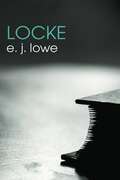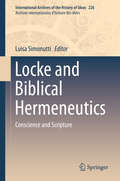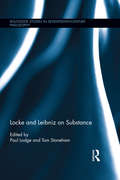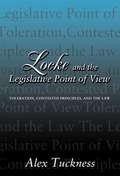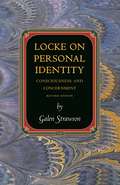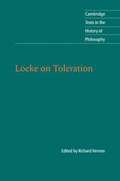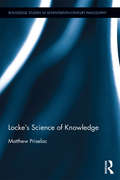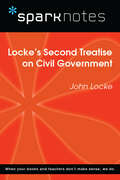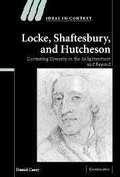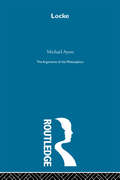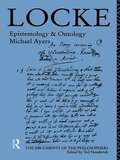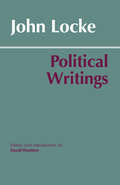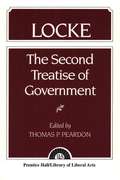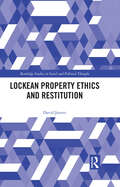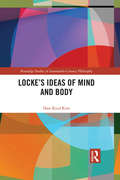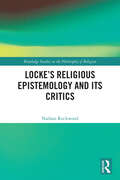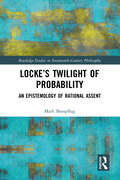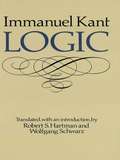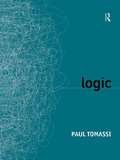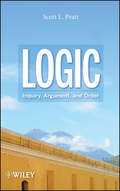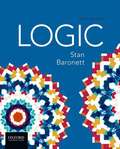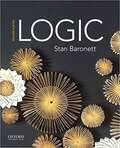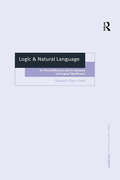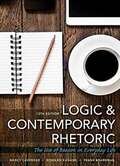- Table View
- List View
Locke (The Routledge Philosophers)
by E.J. LoweJohn Locke (1632-1704) was one of the towering philosophers of the Enlightenment and arguably the greatest English philosopher. Many assumptions we now take for granted, about liberty, knowledge and government, come from Locke and his most influential works, An Essay Concerning Human Understanding and Two Treatises of Government. In this superb introduction to Locke's thought, E.J. Lowe covers all the major aspects of his philosophy. Whilst sensitive to the seventeenth-century background to Locke's thought, he concentrates on introducing and assessing Locke in a contemporary philosophical setting, explaining why he is so important today.Beginning with a helpful overview of Locke's life and times, he explains how Locke challenged the idea that the human mind and knowledge of the external world rested on innate principles, laying the philosophical foundations of empiricism later taken up by Berkeley and Hume. Subsequent chapters introduce and critically assess topics fundamental to understanding Locke: his theories of substance and identity, language and meaning, philosophy of action and free will, and political freedom and toleration. In doing so, he explains some of the more complex yet pivotal aspects of Locke's thought, such as his theory that language rests on ideas and how Locke's theory of personal identity paved the way for modern empirical psychology. A final chapter assesses Locke's legacy, and the book includes a helpful chronology of Locke's life and glossary of unfamiliar terms.
Locke and Biblical Hermeneutics: Conscience and Scripture (International Archives of the History of Ideas Archives internationales d'histoire des idées #226)
by Luisa SimonuttiThe volume presents illuminating research carried out by international scholars of Locke and the early modern period. The essays address the theoretical and historical contexts of Locke’s analytical methodology and come together in a multidisciplinary approach that sets biblical hermeneutics in relation to his philosophical, historical, and political thought, and to the philological and doctrinal culture of his time. The contextualization of Locke’s biblical hermeneutics within the contemporary reading of the Bible contributes to the analysis of the figure of Christ and the role of Paul’s theology in political and religious thought from the seventeenth century to the Enlightenment. The volume sheds light on how Locke was appreciated by his contemporaries as a biblical interpreter and exegete. It also offers a reconsideration that overarches interpretations confined within specific disciplinary ambits to address Locke’s thought in a global historic context.
Locke and Leibniz on Substance (Routledge Studies in Seventeenth-Century Philosophy)
by Paul Lodge Tom StonehamLocke and Leibniz on Substance gathers together papers by an international group of academic experts, examining the metaphysical concept of substance in the writings of these two towering philosophers of the early modern period. Each of these newly-commissioned essays considers important interpretative issues concerning the role that the notion of substance plays in the work of Locke and Leibniz, and its intersection with other key issues, such as personal identity. Contributors also consider the relationship between the two philosophers and contemporaries such as Descartes and Hume.
Locke and the Legislative Point of View: Toleration, Contested Principles, and the Law
by Alex TucknessDetermining which moral principles should guide political action is a vexing question in political theory. This is especially true when faced with the "toleration paradox": believing that something is morally wrong but also believing that it is wrong to suppress it. In this book, Alex Tuckness argues that John Locke's potential contribution to this debate--what Tuckness terms the "legislative point of view"--has long been obscured by overemphasis on his doctrine of consent. Building on a line of reasoning Locke made explicit in his later writings on religious toleration, Tuckness explores the idea that we should act politically only on those moral principles that a reasonable legislator would endorse; someone, that is, who would avoid enacting measures that could be self-defeating when applied by fallible human beings. Tuckness argues that the legislative point of view has implications that go far beyond the question of religious toleration. Locke suggests an approach to political justification that is a provocative alternative to the utilitarian, contractualist, and perfectionist approaches dominating contemporary liberalism. The legislative point of view is relevant to our thinking about many types of disputed principles, Tuckness writes. He examines claims of moral wrong, invocations of the public good, and contested political roles with emphasis on the roles of legislators and judges. This book is must reading not only for students and scholars of Locke but all those interested in liberalism, toleration, and constitutional theory.
Locke on Personal Identity: Consciousness and Concernment - Updated Edition (Princeton Monographs in Philosophy #42)
by Galen StrawsonJohn Locke's theory of personal identity underlies all modern discussion of the nature of persons and selves—yet it is widely thought to be wrong. In this book, Galen Strawson argues that in fact it is Locke’s critics who are wrong, and that the famous objections to his theory are invalid. Indeed, far from refuting Locke, they illustrate his fundamental point.Strawson argues that the root error is to take Locke’s use of the word "person" as merely a term for a standard persisting thing, like "human being." In actuality, Locke uses "person" primarily as a forensic or legal term geared specifically to questions about praise and blame, punishment and reward. This point is familiar to some philosophers, but its full consequences have not been worked out, partly because of a further error about what Locke means by the word "conscious." When Locke claims that your personal identity is a matter of the actions that you are conscious of, he means the actions that you experience as your own in some fundamental and immediate manner.Clearly and vigorously argued, this is an important contribution both to the history of philosophy and to the contemporary philosophy of personal identity.
Locke on Toleration
by John Locke Richard Vernon Michael SilverthorneJohn Locke's Letter Concerning Toleration (1689) is one of the most widely-read texts in the political theory of toleration, and a key text for the liberal tradition. However, Locke also defended toleration more extensively in three subsequent Letters, which he wrote in response to criticism by an Anglican cleric, Jonas Proast. This edition, which includes a new translation of the original Letter, by Michael Silverthorne, enables readers to assess John Locke's theory of toleration by studying both his classic work and essential extracts from the later Letters. An introduction by Richard Vernon sets Locke's theory in its historical context and examines the key questions for contemporary political theorists which arise from this major work in the history of political thought.
Locke's Science of Knowledge (Routledge Studies in Seventeenth-Century Philosophy)
by Matt PriselacJohn Locke’s An Essay Concerning Human Understanding begins with a clear statement of an epistemological goal: to explain the limits of human knowledge, opinion, and ignorance. The actual text of the Essay, in stark contrast, takes a long and seemingly meandering path before returning to that goal at the Essay’s end—one with many detours through questions in philosophy of mind, metaphysics, and philosophy of language. Over time, Locke scholarship has come to focus on Locke’s contributions to these parts of philosophy. In Locke’s Science of Knowledge, Priselac refocuses on the Essay’s epistemological thread, arguing that the Essay is unified from beginning to end around its compositional theory of ideas and the active role Locke gives the mind in constructing its thoughts. To support the plausibility and demonstrate the value of this interpretation, Priselac argues that—contrary to its reputation as being at best sloppy and at worst outright inconsistent—Locke’s discussion of skepticism and account of knowledge of the external world fits neatly within the Essay’s epistemology.
Locke's Second Treatise on Civil Government (SparkNotes Philosophy Guide)
by SparkNotesLocke's Second Treatise on Civil Government (SparkNotes Philosophy Guide) Making the reading experience fun! SparkNotes Philosophy Guides are one-stop guides to the great works of philosophy–masterpieces that stand at the foundations of Western thought. Inside each Philosophy Guide you&’ll find insightful overviews of great philosophical works of the Western world.
Locke, Science, and Politics
by Steven FordeIn this groundbreaking book, Steven Forde argues that John Locke's devotion to modern science deeply shaped his moral and political philosophy. Beginning with an account of the classical approach to natural and moral philosophy, and of the medieval scholasticism that took these forward into early modernity, Forde explores why the modern scientific project of Francis Bacon, Pierre Gassendi, Robert Boyle and others required the rejection of the classical approach. Locke fully subscribed to this rejection, and took it upon himself to provide a foundation for a compatible morality and politics. Forde shows that Locke's theory of moral 'mixed modes' owes much to Pufendorf, and is tailored to accommodate science. The theory requires a divine legislator, which in turn makes natural law the foundation of morality, rather than individual natural right. Forde shows the ways that Locke's approach modified his individualism, and colored his philosophy of property, politics and education.
Locke, Shaftesbury, and Hutcheson: Contesting Diversity in the Enlightenment and Beyond
by Daniel CareyAre human beings linked by a common nature, or are they fragmented by different cultural practices and values? These fundamental moral questions were debated in the Enlightenment by Locke, Shaftesbury, and Hutcheson. Daniel Carey explores the relationship between these founding arguments and contemporary disputes over cultural diversity and multiculturalism.
Locke-Arg Philosophers (Arguments Of The Philosophers Ser. #12)
by Michael AyersFirst published in 1999. Routledge is an imprint of Taylor & Francis, an informa company.
Locke: Epistemology and Ontology
by Michael AyersJohn Locke is the greatest English philosopher. An Essay Concerning Human Understanding, one of the most influential books in the history of thought, is his greatest work. In this study the historical meaning and philosophical significance of Locke's Essay are investigated more comprehensively than ever before. Locke was originally published in two volumes, Epistemology and Ontology. This paperback edition has within its covers the full text of both volumes.
Locke: Political Writings
by John Locke David WoottonJohn Locke's Second Treatise of Government (c. 1681) is perhaps the key founding liberal text. A Letter Concerning Toleration, written in 1685 (a year when a Catholic monarch came to the throne of England and Louis XVI unleashed a reign of terror against Protestants in France), is a classic defense of religious freedom. Yet many of Locke's other writings--not least the Constitutions of Carolina, which he helped draft--are almost defiantly anti-liberal in outlook.This comprehensive collection brings together the main published works (excluding polemical attacks on other people's views) with the most important surviving evidence from among Locke's papers relating to his political philosophy. David Wootton's wide-ranging and scholarly Introduction sets the writings in the context of their time, examines Locke's developing ideas and unorthodox Christianity, and analyzes his main arguments. The result is the first fully rounded picture of Locke's political thought in his own words.
Lockean Property Ethics and Restitution (Routledge Studies in Social and Political Thought)
by David JarrettIn this book, David Jarrett argues that the influential Lockean thesis of justice in property, which traces back to John Locke, seems to entail much egalitarian property redistribution. Put briefly, Lockeans argue that people justly own: (1) any unowned natural resources they labour on, (2) any resources they receive via voluntary transfer from a legitimate owner, and (3) any resources they legitimately receive in compensation for harm done to their person or legitimately held property. However, a question that has been largely overlooked by Lockeans is how to address the problem of property which did not arise in line with Lockean justice. What do we do about property which derives from feudal and colonial conquest, for example? Drawing on a range of theoretical and historical sources, this book argues that the legal concept of restitution is the most reasonable way to address the problem. If we apply this concept, it appears that much property in the world is held unjustly and should be redistributed in an egalitarian manner. Lockean Property Ethics and Restitution will be of interest to political theorists and philosophers alike.
Locke’s Ideas of Mind and Body (Routledge Studies in Seventeenth-Century Philosophy)
by Han-Kyul KimThis book begins with a survey of various readings of Locke as a materialist, as a substance dualist, and as a property dualist, and demonstrates that these inconsistent interpretations result from a general failure of modern commentators to notice the significance of Locke’s ‘mind-body nominalism’. By illuminating this largely overlooked aspect of Locke’s philosophy, this book reveals a common mistake of previous interpretations: that of treating what Locke conceives to be ‘nominal’ as real. The nominal symmetry that Locke posits between mind and body is distinct from any form of metaphysical dualism, whether substance dualism or property dualism. It is a brand of naturalism, but does not insist that the material is ontologically more basic than the mental or that the former determines the latter. On this view, the material and the mental both relate solely to a certain set of functional roles, rather than to an intrinsic property that plays these roles. The term ‘matter’ is thus rendered vague, and materialism is conceived as a precariously grounded ontological doctrine. Elaborating on this interpretation of Locke’s Essay, this book examines the insightful readings of Locke developed by seventeenth- and eighteenth-century thinkers such as Richard Burthogge, William Carroll, and Joseph Priestley. This book also seeks to clarify what Locke’s position would look like in a modern setting by noting some significant parallels with the ideas of leading contemporary philosophers such as Donald Davidson, David Lewis, and Colin McGinn.
Locke’s Religious Epistemology and Its Critics (Routledge Studies in the Philosophy of Religion)
by Nathan RockwoodThis book offers a sustained defense of Locke’s religious epistemology. It puts Locke into conversation with leading figures in contemporary religious epistemology and shows that Locke’s views are more plausible than many philosophers of religion and epistemologists realize. Locke has become the villain in contemporary religious epistemology. In recent years, Locke has often been singled out and criticized for insisting that religious belief requires evidence and for failing to provide adequate evidence that would support rational belief in God and Christianity. This book defends a broadly Lockean religious epistemology. The author argues that we need evidence for religion and that there is good evidence supporting belief in God and Christianity. He discusses Locke’s views on the evidence from natural theology, religious experience, the testimony of miracles, and scripture. In each chapter, the author contrasts Locke’s view on a type of evidence with one of his critics: Michael Bergmann, David Hume, Alvin Plantinga, Richard Swinburne, and Linda Zagzebski. At the end of each chapter, the author shows how a Bayesian analysis of evidence can support Locke’s evidence for religious belief, specifically a belief in Christianity. This defense of Locke’s position shows how his religious epistemology continues to be relevant in contemporary debates. Locke’s Religious Epistemology and Its Critics is a historically informed contribution to religious epistemology. It will appeal to researchers and graduate students working in epistemology, philosophy of religion, and history of philosophy.
Locke’s Twilight of Probability: An Epistemology of Rational Assent (Routledge Studies in Seventeenth-Century Philosophy)
by Mark BoespflugThis book provides a systematic treatment of Locke’s theory of probable assent and shows how the theory applies to Locke’s philosophy of science, moral epistemology, and religious epistemology. There is a powerful case to be made that the most important dimension of Locke’s philosophy is his theory of rational probable assent, rather than his theory of knowledge. According to Locke, we largely live our lives in the “twilight of probability” rather than in “the sunshine of certain knowledge.” Locke’s theory of probable assent has far-reaching significance insofar as it contains a wealth of novel, independently interesting, and prescient elements that precede the modern field of formal epistemology. In this book, the author argues for the central role of probable assent in Locke’s philosophy. Locke’s theory of probable assent is based on an epistemic modesty that claims, roughly, that our cognitive abilities are limited and that we ought to carry ourselves in believing with due caution. This modesty motivates the author’s discussion of other aspects of Locke’s epistemology, notably his principle of proportionality, his doxastic involuntarism, his epistemological pragmatism, and his theory of testimony. The book concludes by connecting the theory of probable assent with Locke’s views on the limits of science, moral epistemology, and the rationality of faith. Locke’s Twilight of Probability will appeal to scholars and advanced students working on Locke and the history of early modern philosophy.
Logic
by Immanuel KantThe second, corrected edition of the first and only complete English translation of Kant's highly influential introduction to philosophy, presenting both the terminological and structural basis for his philosophical system, and offering an invaluable key to his main works, particularly the three Critiques. Extensive editiorial apparatus.
Logic
by Paul TomassiBringing elementary logic out of the academic darkness into the light of day, Paul Tomassi makes logic fully accessible for anyone attempting to come to grips with the complexities of this challenging subject. Including student-friendly exercises, illustrations, summaries and a glossary of terms, Logic introduces and explains: * The Theory of Validity* The Language of Propositional Logic* Proof-Theory for Propositional Logic* Formal Semantics for Propositional Logic including the Truth-Tree Method* The Language of Quantificational Logic including the Theory of Descriptions. Logic is an ideal textbook for any logic student: perfect for revision, staying on top of coursework or for anyone wanting to learn about the subject. Related downloadable software for Macs and PCs is available for this title at www.logic.routledge.com.
Logic
by Scott L. PrattAn enlightening introduction to the study of logic: its history, philosophical foundations, and formal structuresLogic: Inquiry, Argument, and Order is the first book of its kind to frame the study of introductory logic in terms of problems connected to wider issues of knowledge and judgment that arise in the context of racial, cultural, and religious diversity. With its accessible style and integration of philosophical inquiry and real-life concerns, this book offers a novel approach to the theory of logic and its relevance to questions of meaning and value that arise in the world around us.The book poses four problems for logic: Is logic separate from experience? Does logic require dualisms? Can logic reconcile opposed ways of understanding the world? And when things are divided, does the boundary have a logic? The author begins the exploration of these questions with a discussion of the process of analyzing and constructing arguments. Using the logical theories of C. S. Peirce, John Dewey, and Josiah Royce to frame the investigation, subsequent chapters outline the process of inquiry, the concept of communicative action, the nature of validity, categorical reasoning through the theory of the syllogism, and inductive reasoning and probability. The book concludes with a presentation of modal logic, propositional logic, and quantification.Logic is presented as emerging from the activities of inquiry and communication, allowing readers to understand even the most difficult aspects of formal logic as straightforward developments of the process of anticipating and taking action. Numerous practice problems use arguments related to issues of diversity and social theory, and the book introduces methods of proving validity that include Venn diagrams, natural deduction, and the method of tableaux.Logic: Inquiry, Argument, and Order is an ideal book for courses on philosophical methods and critical reasoning at the upper-undergraduate and graduate levels. It is also an insightful reference for anyone who would like to explore a cross-cultural approach to the topic of logic.
Logic
by Stan BaronettA comprehensive and student-friendly introduction, Logic demonstrates the relevance of logic and critical reasoning in everyday life. Featuring an exceptionally clear writing style and a wealth of real-world examples and exercises, this text shows the applications of logic in such areas as theworkplace, media and entertainment, politics, science and technology, and student life.
Logic
by Stan BaronettFeaturing an exceptionally clear writing style and a wealth of real-world examples and exercises, Logic, Fourth Edition, shows how logic relates to everyday life, demonstrating its applications in such areas as the workplace, media and entertainment, politics, science and technology, student life, and elsewhere. The examples and exercises were chosen to be interesting, thought-provoking, and relevant to students. <P><P> The text is enhanced by Dashboard, Oxford University Press' learning management platform, which offers a wealth of learning resources, including interactive proof-checking and truth table exercises. The fourth edition features new illustrations in Chapter 1; clearer treatments of existential import and the traditional square of opposition in Chapter 5; and a new appendix, "The LSAT and Logical Reasoning."
Logic & Natural Language: On Plural Reference and Its Semantic and Logical Significance (Ashgate New Critical Thinking in Philosophy)
by Hanoch Ben-YamiFrege's invention of the predicate calculus has been the most influential event in the history of modern logic. The calculus’ place in logic is so central that many philosophers think, in fact, of it when they think of logic. This book challenges the position in contemporary logic and philosophy of language of the predicate calculus claiming that it is based on mistaken assumptions. Ben-Yami shows that the predicate calculus is different from natural language in its fundamental semantic characteristics, primarily in its treatment of reference and quantification, and that as a result the calculus is inadequate for the analysis of the semantics and logic of natural language. Ben-Yami develops both an alternative analysis of the semantics of natural language and an alternative deductive system comparable in its deductive power to first order predicate calculus but more adequate than it for the representation of the logic of natural language. Ben-Yami's book is a revolutionary challenge to classical first order predicate calculus, casting doubt on many of the central claims of modern logic.
Logic And Contemporary Rhetoric: The Use Of Reason In Everyday Life (Mindtap Course List Ser.)
by Frank Boardman Nancy M. Cavender Howard KahaneLOGIC AND CONTEMPORARY RHETORIC: THE USE OF REASON IN EVERYDAY LIFE, 13th Edition, introduces you to sound reasoning using current, relevant, and stimulating examples in a witty and invigorating writing style. Combining examples from television, newspapers, magazines, advertisements, and our nation's political dialogue, this classic text brings the concepts to life and puts critical-thinking skills into a context that you will retain and use throughout your life.
